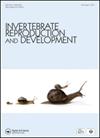Gametogenic cycle of the marine gastropod Trophon geversianus in a harsh Patagonian intertidal environment
IF 0.8
4区 生物学
Q4 REPRODUCTIVE BIOLOGY
引用次数: 0
Abstract
ABSTRACT The edible marine gastropod Trophon geversianus shows a large geographic distribution along the southern tip of South America, inhabiting both rocky intertidal and shallow subtidal zones, with distinct behavioural responses to environmental stressful conditions (desiccation, temperature amplitude and high irradiation). Nevertheless, its reproductive biology has been poorly reported to date. We studied the gametogenic cycle of an intertidal rocky shore population from northern Patagonia (Argentina), in order to investigate the relation between gonadal changes and seasonal environmental variables. Mature individuals were taken monthly during an annual reproductive season and processed by standard histology procedures (haematoxylin and eosin). Adults of T. geversianus registered different gonadal maturation stages along the year, showing a marked seasonal variation without a resting period. The highest gamete evacuation season in both sexes was registered when the environmental stress was minimum (winter), while a greater number of individuals with gonads in proliferation and growth were predominant during maximum environmental stress (summer). The reproduction pattern presented an extended period of evacuation and a short phase of non-evacuation, associated to drastic seasonal environmental changes in the intertidal zone of Atlantic Patagonia. This information is useful to protect the resource and assure the sustainability of intertidal populations.在恶劣的巴塔哥尼亚潮间带环境中海洋腹足动物滋养体的配子发生循环
可食用的海洋腹足类营养鱼(troon geversianus)在南美洲南端分布广泛,栖息于岩石潮间带和浅水潮下带,对环境应激条件(干燥、温度振幅和高辐照)有不同的行为反应。然而,迄今为止对其生殖生物学的报道很少。本文研究了阿根廷巴塔哥尼亚北部潮间带岩岸种群的配子体发育周期,探讨了性器官变化与季节环境变量的关系。在每年的繁殖季节,每月采集成熟个体,并通过标准组织学程序(血红素和伊红)进行处理。成虫全年性腺成熟阶段不同,无休止期,有明显的季节变化。环境胁迫最小时(冬季)是雌雄配子疏散最多的季节,环境胁迫最大时(夏季)生殖腺处于增殖和生长状态的个体数量较多。大西洋巴塔哥尼亚潮间带的繁殖模式呈现出较长的疏散期和较短的非疏散期,这与剧烈的季节性环境变化有关。这些资料对保护资源和确保潮间带种群的可持续性是有用的。
本文章由计算机程序翻译,如有差异,请以英文原文为准。
求助全文
约1分钟内获得全文
求助全文
来源期刊
CiteScore
1.90
自引率
0.00%
发文量
21
审稿时长
>12 weeks
期刊介绍:
Invertebrate Reproduction & Development ( IRD) presents original research on the reproductive and developmental biology of the Invertebrata, both embryonic and postembryonic. IRD welcomes papers reporting significant results obtained using new techniques. Encouraged topic areas include: aquaculture, physiology, biochemistry, functional morphology, phylogeny, behavioural and regulatory mechanisms, including genetic, endocrine and molecular studies. Papers containing qualitative descriptions of reproductive cycles and gametogenesis will not be considered. IRD is published in association with the International Society of Invertebrate Reproduction and Development.

 求助内容:
求助内容: 应助结果提醒方式:
应助结果提醒方式:


